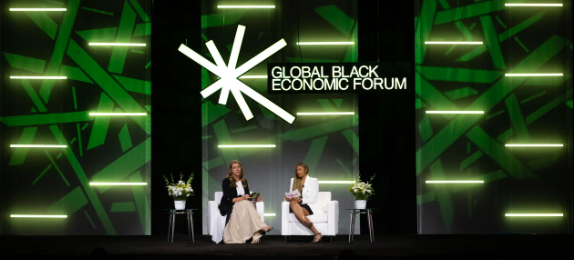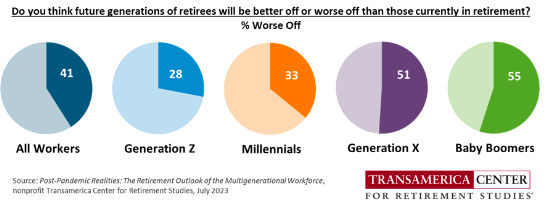Brief • 5 min Read
The latest trends in culture and society from The Harris Poll.
In this week’s job report, unemployment fell to 3.6% as the economy added 209,000 jobs. Still, the jobless rate was down from 3.7% in May. Yet public confidence is still shaky. In our America This Week survey, fielded from July 7th to July 9th among 2,042 Americans, widespread concern lingers:
- (85%) the economy and inflation (-2%-pt from June 9th to 11th)
- (81%) a potential U.S. recession (-2%-pt)
- (70%) affording their living expenses (-3%-pt)
- (69%) the solvency of U.S banks (-2%-pt)
- (67%) a banking crisis (-3%-pt)
- (60%) the security of their deposits in banks (-6%-pt)
- (48%) about losing their job (0%-pt)
Four new Harris Polls caught our eyes this week. First, our CSO Libby Rodney and Brand Citizen’s Lauryn Nwankpa discuss the state of inequities in work, wealth, and health. Also, LGBTQIA+’s conscious consumerism toward brands that fail to be prideful. Next, we examine the financial insecurity many middle-class Americans feel. And finally, the future prediction is that retirement won’t be what it is today for future generations.
You can download the new ATW monthly summary tabs and June deck here.
There’s A Sense of Allyship, But Little Action: Essence Festival-Harris Poll
Harris Poll’s CSO Libby Rodney and Brand Citizen’s Lauryn Nwankpa, Co-Managing Director, presented “Grounded in Truth: The State of Work, Wealth, and Health Equities” at the Global Black Economic Forum HQ Stage at this year’s Essence Festival in New Orleans. Watch the full presentation here.

Libby Rodney & Lauryn Nwankpa at the 2023 Essence Festival
The State of Work
- Despite promises to improve workplace environments and hiring, BIPOC employees report little progress since June 2020, with 4 in 5 reporting that their employer has not increased recruiting efforts toward racially diverse hiring nor has made meaningful progress on building a more equitable environment for Employees of Color.
- Women of color face persistent barriers: Corporate culture has long struggled with the disparate work experiences of BIPOC women, with BIPOC women being nearly 2x as likely to report they have not had the same opportunities and chances to succeed as any other person within their company.
The State of Health
- BIPOC Americans were more likely to report receiving poor quality healthcare in the past year, with (60%) of Black millennial women saying “they have been dismissed or misdiagnosed by medical professionals.”
- Yet, BIPOC Americans are reorienting their priorities and sense of well-being: Compared to three years ago, (83%) of BIPOC Americans are now setting more boundaries about how they spend their time, and (69%) are participating in rest culture.
Takeaway: “The data generally show that the inequities are still persistent, and they have not changed in the workplace, health care, and wealth. So it’s a foundational truth that we need to recognize so that we have a place to grow and move on from,” said Rodney. Nwankpa said that the importance of having the numbers is seeing where the gaps are and the kind of gaps that exist so “we can continue to work towards more equality and equity collectively.” Additionally, she underscored the importance of looking at the systemic issues at large and ways institutions can assist in breaking down barriers to access.
Brands, You’re Doing Pride Allyship Wrong: Fast Company-Harris Poll
In the wake of controversies around Bud Lite and Target, new Harris Poll research featured in Fast Company reveals that the queer community is fighting back with its wallet.
- The report surveyed 1,110 adults who identify as LGBTQIA+, revealing that the queer community is closely watching what brands are saying and doing, as (89%) said they closely follow brands’ actions to support queer issues.
- Walking their talk: (65%) say they’ve boycotted brands that harm or diminish queer people or threaten their rights.
- Brands should be aware of performative messaging, as while (72%) say they want brands to be more outspoken supporters of LGTBQIA+ rights, company social media posts announcing support, using rainbow logos, and hiring celebrities to speak on the brand’s behalf are primarily viewed as performative (84%, 79%, 59%).
- Instead, brands should be adopting meaningful actions, such as investing in long-term programs to help the community (66%), advocating for new legislation (64%), diversity training and education programs (60%), and financial commitments to queer causes (59%).
Takeaway: All in all, the LGBTQ+ community is certainly not here for lip service. Its members demand real support – money, inclusion, and the resolve to not fall back just because of those who stand against their rights. Brands have much power to shape our world, and the queer community knows that.
The Middle-Class Angst: Bloomberg-Harris Poll
As the 2024 election cycle gears up, there is a keen focus on the middle-class, those with annual incomes between $45,000 and $180,000 and wealth between $100,000 and $1 million, who detail persistent angst about the future, according to our latest collaboration with Bloomberg, where the findings were also featured on an episode of their podcast The Big Take.
- More than $2 trillion in wealth held by the middle-class has been eliminated since the Fed started hiking, according to data compiled by economists at the University of California, Berkeley, and just (39%) of those 100 million Americans defined as middle-class say they expect their situation to get better in the next year (compared to 35% in October).
- The financial is feeding the apprehension in polls and fueling a partisan divide: Just (46%) of middle-class Republicans said their financial situation was better than five years ago, when Donald Trump was in the White House, versus (64%) of middle-class Democrats. Only (35%) of Republicans said they expect things to improve in the next year, compared with (43%) of Democrats.
- Leaving more Republicans to say they are feeling stressed about the current state of the economy compared to Democrats (48% v. 32%).

Takeaway: The post-pandemic surge in inflation and the Federal Reserve’s reaction – the fastest increase in interest rates since the 1980s – have combined to put the middle-class in a financial vice grip. They pay more for everything – food, homes, cars, energy – while the end of the easy-money era means loans are more costly. For Biden, that’s a fundamental problem about a year and a half from the election. He offers a relentlessly optimistic view of the economy and the future of the middle-class. And yet the very subjects of his vision say they’re in pain – and they’re more than a little anxious about what lies ahead.
A Delayed Retirement: Transamerica Institute-Harris Poll
We found that retirement security across generations is faltering in a new Harris Poll with the Transamerica Institute and the Transamerica Center for Retirement Studies.
- Two-fifths (41%) of U.S. employees say future generations of retirees will be worse off than those currently in retirement. A sentiment that is stronger among older Americans:

- Gen Z already dipping into their retirement savings: Almost 6 in 10 Gen Z workers (57%) have trouble making ends meet, and an alarming percentage (28%) have dipped into their retirement savings by taking a hardship withdrawal or early withdrawal from a 401(k) or similar plan or IRA.
- Sandwiched Millennials feeling the financial burn as well: Millennial workers’ current financial priorities include paying off debt (60%), saving for retirement (52%), building emergency savings (46%), supporting children (44%), and supporting their parents (17%).
- Retirement is getting increasingly out of reach: More than half (52%) of employees said they expect to work past age 65 or don’t plan to retire, and among these respondents, (40%) said they expect to retire at age 70 or older.
Takeaway: “The pandemic and turbulent economy have taken a toll on workers’ employment, finances, and retirement preparations. Without additional support from policymakers and employers, it will be tough for many workers to recover,” said Catherine Collinson, CEO and president of Transamerica Institute and TCRS.
Subscribe for more Insights
Subscribe to our newsletter for the latest trends in business, politics, culture, and more.
Download the Data
This survey was conducted online within the U.S. by The Harris Poll from July 7th to 9th among a nationally representative sample of 2,042 U.S. adults.
Download
Subscribe for more Insights
Subscribe to our newsletter for the latest trends in business, politics, culture, and more.
Download the Data
This survey was conducted online within the U.S. by The Harris Poll from July 7th to 9th among a nationally representative sample of 2,042 U.S. adults.
DownloadRelated Content







